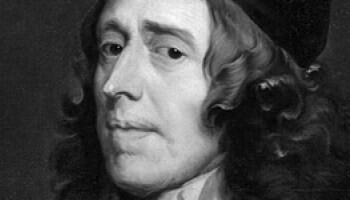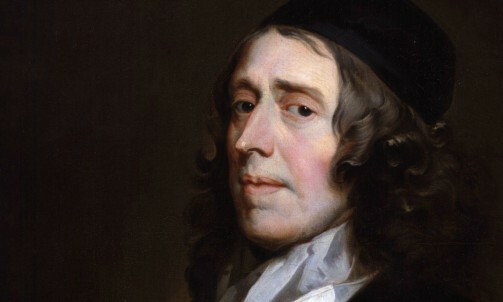A Biographical Sketch of John Owen - Part 2

Last week I posted the first part of a biographical sketch of John Owen, a famous puritan pastor. That post included information about his early life, education, and civic influence.
The post below will discuss his theology and contributions as an author. Enjoy!
John Owen: Theologian and Author
John Owen was a theologian. Trueman says, “If one wishes to understand either the nature of Reformed Orthodoxy in the 17th century or the kind of theological thought of non-conformity in Restoration England, then there are few if any better candidates for study than John Owen.”[1]
Owen received his first taste of theology under the teaching and practices of the Presbyterian church. However, after taking a season of his life to study differing views of church polity he became a convinced congregationalist. Specifically, Owen found John Cotton’s The Keyes of the Kingdom of Heaven as especially persuasive. After reading that book Owen came to see the hierarchical structure of the presbytery as unbiblical, though he did not embrace a completely egalitarian view of the congregation and the elders.[2] Reflecting on Cotton’s book Owen said, “In the pursuit and management of this work, quite beside and contrary account but ruin in this world, without the knowledge of advice of, or conference with, any one person of that judgment, I was prevailed on the receive that and those principles which I had thought to have set myself in an opposition unto.”[3] Owen immediately began meeting with believers while attempting to put these new found principles into practice. He would later be indicted “for having religious conventicles in his home” as he gathered together with those who embraced this new form of polity.[4]
Not only was Owen influential in spreading Congregational polity, but he was also a prolific author who wrote scores of publications on the subjects of theology and Christian practice. Like many puritan authors, Owen is known for his lengthy, verbose, and sometimes confusing syntax. His writings are often very difficult for the modern reader to work through. Even so, for those who take the time and put in the effort necessary to complete one of Owen’s works, the writings often prove to be both powerful and timely.
In 1642, John Owen published his first work, A Display of Arminianism. This should not be surprising for those who know John Owen and his fundamental theological convictions. Early in Owen’s life while still pursuing formal education he was discipled by a man named Thomas Barlowe.[5] Barlowe was a convinced Calvinist who trained Owen in the Reformed soteriology of Presbyterianism and taught Owen the dangers of Arminianism. One needs only to read the introduction to A Display to see Owen’s thoughts about Arminianism. There he says, “Never were so many prodigious errors [as Arminianism] introduced into a church, with so high a hand and so little opposition, as these into ours, since the nation of Christians was known in the world.”[6] Though his views on church polity changed during his life, it seems that his views on God’s sovereignty in salvation only solidified as he grew older and eventually characterized his life and ministry.
Owen’s most significant work is The Death of Death in the Death of Christ. Written in 1647, The Death of Death is Owen’s magnum opus which tackles the controversial topic of particular redemption, also known as limited atonement. He argued in The Death of Death that the atonement of Christ was intended to be made only for the elect and it was fully effective, accomplishing exactly what it was intended to do.[7] In other words, Owen argued that Christ’s atonement was not made for every single individual. He says, “Now, if you will ask who these sinners are towards whom he hath this gracious intent and purpose, himself tells you, Matt. xx. 28, that he came to ‘give his life a ransom for many;’ in other places called us, believers, distinguished from the world: for he ‘gave himself for our sins, that he might deliver us from this present evil world, according to the will of God and our Father.’”[8] Not surprisingly, this book stirred up a bit of controversy with others, including another puritan named Richard Baxter who wrote a response to Owen called Aphorismes of Justification. Owen would later respond to Baxter with a second book The Death of Christ, The Price He Paid. Proponents of particular redemption today still point to The Death of Death as the quintessential articulation of their position.
Even those who disagree with Owen on the issue of particular redemption will resonate with his other significantly influential book, The Mortification of Sin. In this book, written in 1656, Owen reflects on Romans 8:13, “If ye through the Spirit do mortify the deeds of the body ye shall live.” He argues that Christians ought to be daily putting to death indwelling sin in their lives. “The choicest believers,” Owen says, “who are assuredly freed from the condemning power of sin, ought yet to make it their business all their days to mortify the indwelling power of sin.”[9] Perhaps the most oft-quoted line from all of John Owen’s works comes from The Mortification of Sin; “Be killing sin or it will be killing you.”
Owen also wrote multiple other works including Communion with God, The Doctrine of Justification by Faith, a book on Covenant Theology, a four-volume exposition on the book of Hebrews, and over eighty other publications. In addition to these, Owen was also known for writing catechisms for both children and adults as a means to training them in sound doctrine.[10] He helped to craft the Savoy Declaration, a confession for Congregational Churches. With such a breadth of influence and publication, it is fitting that Sinclair Ferguson wrote, “John Owen was the theologian of the puritan movement.”[11]
John Owen: Gift to the Church
Owen died on August 24, 1683 at the age of 67 in the town of Ealing after months of slowly declining health. Even during those months as doctors were continually monitoring his condition, Owen continued to write.[12] Today the mind, ministry, and the works of John Owen continue to serve the church well. This should not be surprising once one comprehends just how committed Owen was to the life and ministry of the local church while he was alive. Whether preaching weekly to thousands of congregants at St. Peter’s in Coggeshall or to a seemingly insignificant number of forty Congregationalist church members, John Owen was committed to serve the bride for whom Christ died.
As his reputation and popularity was on the rise in America, Owen received offers to pastor churches in the United States and even become president of Harvard. Owen opted instead to pastor the Ledenhall St. Chapel until his death. The day before Owen died he spoke to one of his friends about his life and his impending death. Even in these final words, Owen demonstrated his continued confidence in the God who had pledged to love and keep him. Though he had once battled trusting in the truth of God’s love for Him, he showed no signs of doubt in the end.
He said, “I am going to Him whom my soul has loved, or rather who has loved me with an everlasting love – which is the whole ground of my consolation…I am leaving the ship of the church in a storm; but whilst the great Pilot is in it, the loss of a poor under-rower will be inconsiderable. Live, pray, and hope, and wait patiently, and do not despond; the promise stands invincible, that He will never leave us, or forsake us.”[13]

